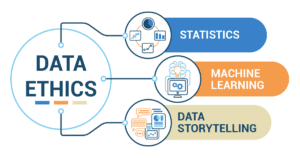Picture this: One day, you enter your favorite store, perhaps it is a physical store or online. You see rows upon rows of products, neatly arranged, from books and video games 🎮 to sporting goods ⚽ and the latest fashion 👕. But there’s more to this scene than meets the eye. With every product you click on and every purchase you make, a piece of data is created. Now, if the online store were to collect this information and use it to understand your preferences, perhaps to recommend new products or offer you relevant discounts, would that be cool with you? Would it matter if they shared this data with other businesses? Or used it to shape not just your shopping but your entire online experience?
These questions might seem ordinary, embedded as they are in our everyday activities. But they touch on a topic of huge significance in our increasingly digital age: Data Ethics. It’s in these simple scenarios that we start grappling with complex issues – privacy, consent, fairness, and transparency. Every one of us, knowingly or unknowingly, is part of this data ecosystem, leaving digital footprints 👣 that get collected, analyzed, and often monetized.
Now, imagine you’re part of the student council planning the next big school event. 🎉 You want to know what activities students would most enjoy. So, you decide to survey your classmates. This is where data ethics starts to play a role in your life.
What is Data Ethics?

It’s like being at a friend’s house. You wouldn’t rummage through their drawers without asking, right? The same applies when collecting data. We must ensure we’re respectful and considerate about the kind of information we collect, how we collect it, and from whom we collect it.
Let’s say we’ve now got our survey responses, and we’re ready to analyze the data. Here, data ethics helps us choose the right methods and keep our assumptions in check. Data ethics comes into play in choosing the right analyses and statistical models, validating assumptions, and managing biases in the models. For instance, we shouldn’t decide beforehand that ‘soccer is the most popular activity’ and then skew our data to show that. Our goal should be to discover the truth, not twist it! It is important to understand that the same dataset can be interpreted in many different ways, and an unethical interpretation can lead to misinformation, false conclusions, and discriminatory practices.
Now, we’re ready to share our findings. Here, too, we must be ethical. Imagine if we presented the data in a way that made it look like everyone loved dodgeball, even though only a few did. This could lead to a dodgeball-dominated event that most students wouldn’t enjoy. Sharing data ethically means representing the facts as they are without spinning or twisting them.
In our world today, data is everywhere – from predicting the latest fashion trends to which movie will be a hit. But like Spiderman’s Uncle Ben said, “With great power comes great responsibility.” We must use data ethically in statistics, machine learning, and data storytelling, to ensure that the information we produce, share, and use is accurate, fair, and respectful to all.
Remember, we’re investigators, not tricksters! The goal is to unveil the truth and use it wisely. And that’s why data ethics is the essential guidebook in our statistical journey.
Henry’s Digital Dilemma: Data Ethics and Social Media Analytics

One day, Henry’s best friend, Lisa, approached him with a request. Lisa was running for student council president, and she thought using social media could give her an edge. Knowing Henry’s knack for technology, she asked him if he could analyze their classmates’ social media data to understand their concerns and craft a campaign that resonated.
Henry was initially thrilled by the idea. But soon, a thought crossed his mind: ‘What about data ethics?’ He had been learning about it in his Statistics class, and he knew the importance of respecting privacy and consent when handling data.
He decided to discuss his concerns with Lisa. He explained that while analyzing social media data could help them understand their classmates’ concerns, they had to be mindful of the ethical implications. They shouldn’t snoop on private posts or collect data without consent. Lisa was surprised but understood the significance of Henry’s point.
Instead of diving directly into their classmates’ data, they came up with a plan that respected their peers’ privacy and consent. Henry designed a voluntary, anonymous online survey and shared it via the school’s social media platforms. In the survey, students could share their thoughts about school policies and changes they’d like to see.
Once the data started rolling in, Henry dove into his analysis. But he knew that data ethics didn’t end with data collection. He carefully chose appropriate methods that wouldn’t twist the results or lead to biased conclusions. He avoided cherry-picking responses or making broad assumptions.
Finally, when it was time to share the findings, Henry again turned to data ethics as his guide. He was cautious not to misrepresent the data to make Lisa look more popular. He shared the findings honestly, showing what the students had voiced through the survey.
Lisa used this data to build a campaign that truly reflected the students’ concerns. She won the election, but more importantly, Henry’s approach led to a campaign that was not just strategic but also ethical.
Henry’s story illustrates how understanding and applying data ethics can guide us in the world of data analytics. Even in our digital age, where information is readily available, it’s crucial to remember the ethical implications of our actions, ensuring we respect privacy, consent, and the truth. Henry may be a high schooler, but his understanding of data ethics is something we all can learn from.